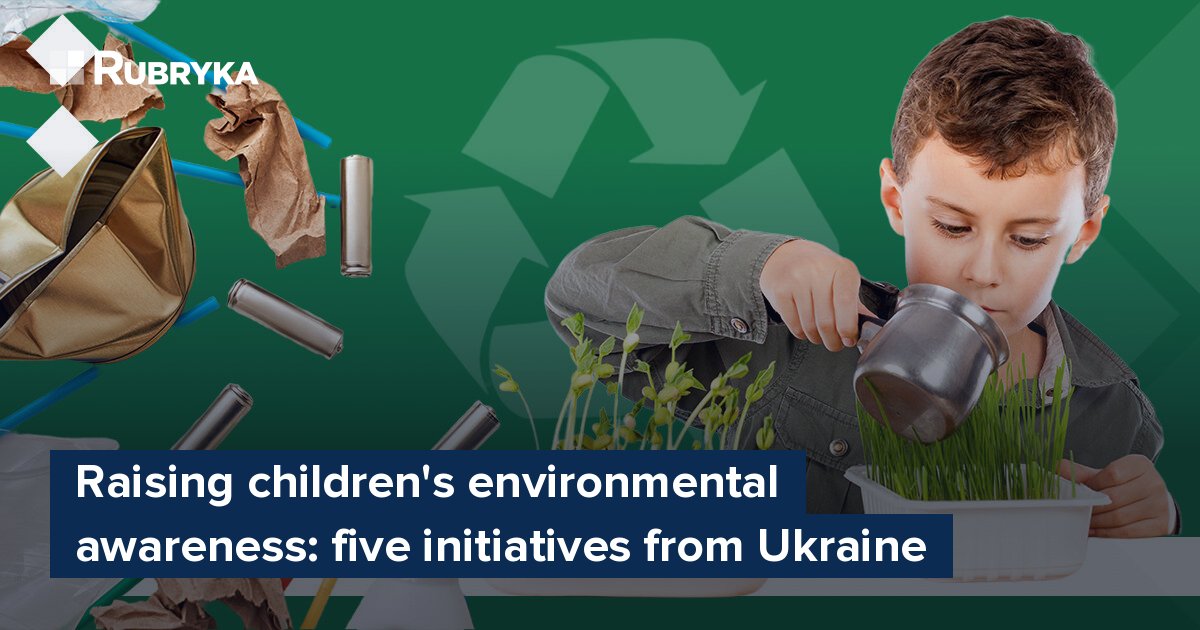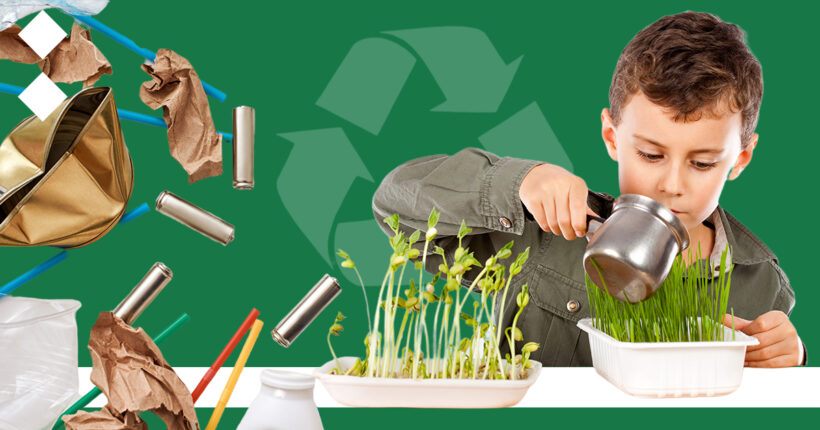
What is the problem?
War causes great damage to nature. Last year alone, the damage to the Ukrainian environment caused by Russian hostilities exceeded $38 billion. The occupiers' shelling has burned steppes and forests, destroyed terrestrial and aquatic ecosystems, and killed species that are under threat of extinction. The Kakhovka dam destruction was an environmental disaster, as once-thriving places are now kilometers of cracked earth and tons of dead fish.
As the war turns more brutal, environmental education in Ukraine becomes increasingly important.
What is the solution?
Even in times of war, scarce resources, and dangerous conditions, raising environmental awareness among children is paramount. Firstly, it helps them understand the relations between humans and nature and the consequences of human influence on the environment. Secondly, children are the future leaders, so their understanding of the environment and their ability to preserve natural resources is an important step toward Ukraine's future recovery and development.
Promoting initiatives that raise children's environmental awareness is more vital than ever.
How does it work?
To care about nature for the sake of peace
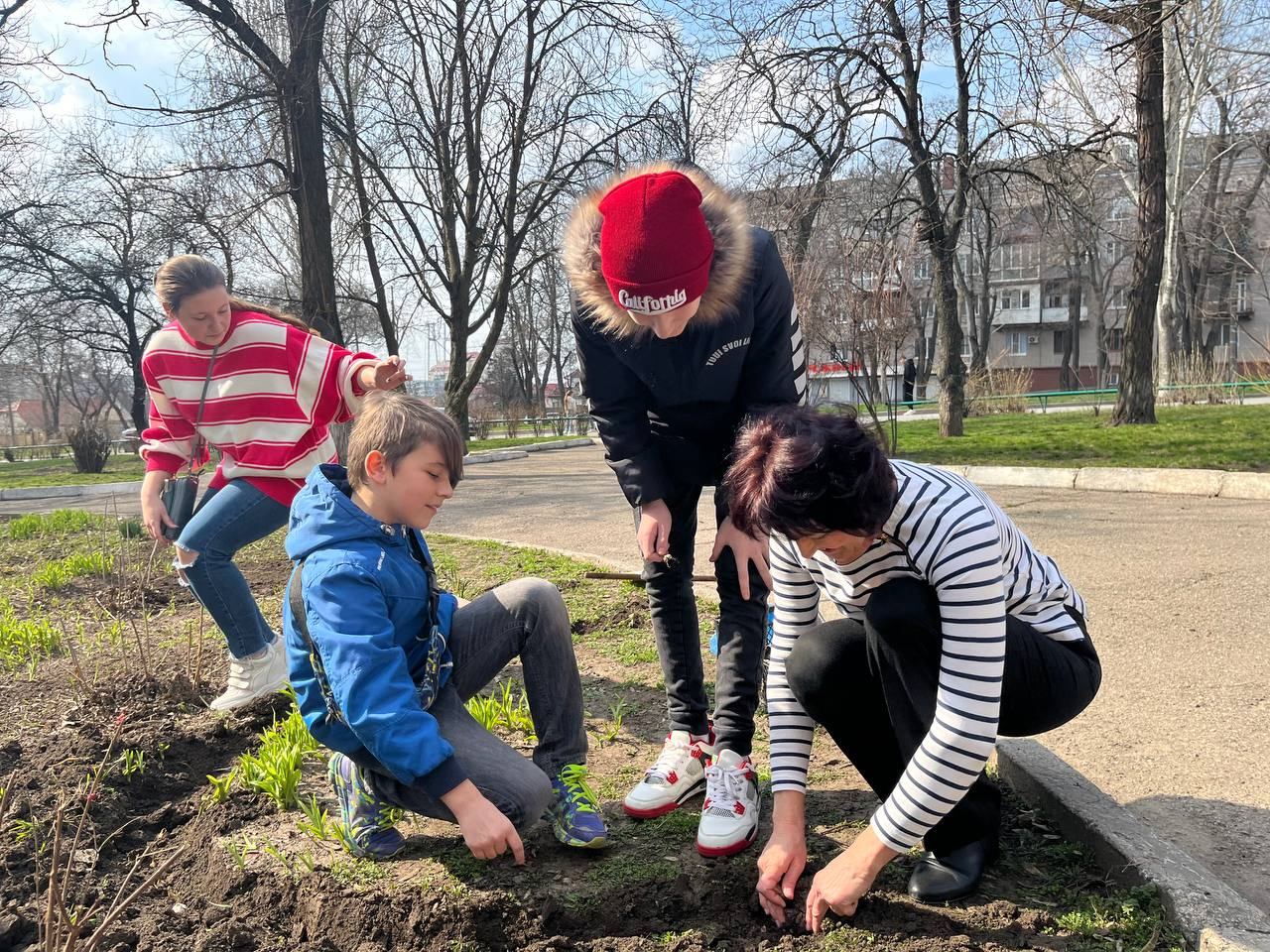
Students of school No. 20, Zaporizhzhia, plant tulip bulbs within the framework of the project Flowers4School
Zaporizhzhia, Ukraine's southern town, had severe ecological issues a long way before the war. School No. 20 teaches children fundamental environmental knowledge, environmental thinking, and awareness. Starting from the first grade, students are taught to treat nature as a universal value.
Educational games, situational exercises, and environmental projects help students understand the connection between theory and real-life practice. Children also include their parents in many tasks, even during the war.
The eco-teams of Zaporizhzhia youngsters plant their arboretum, plant school flower beds, and participate in city clean-ups.
One day the school found the announcement of the Zaporizhzhia regional eco-initiative "Prosper my Land," which aims to green Ukraine. Teachers immediately responded to it, taking it as a challenge for environmentally active students. This spring, even displaced students who study remotely joined the "Plant a Tree of Peace" challenge.
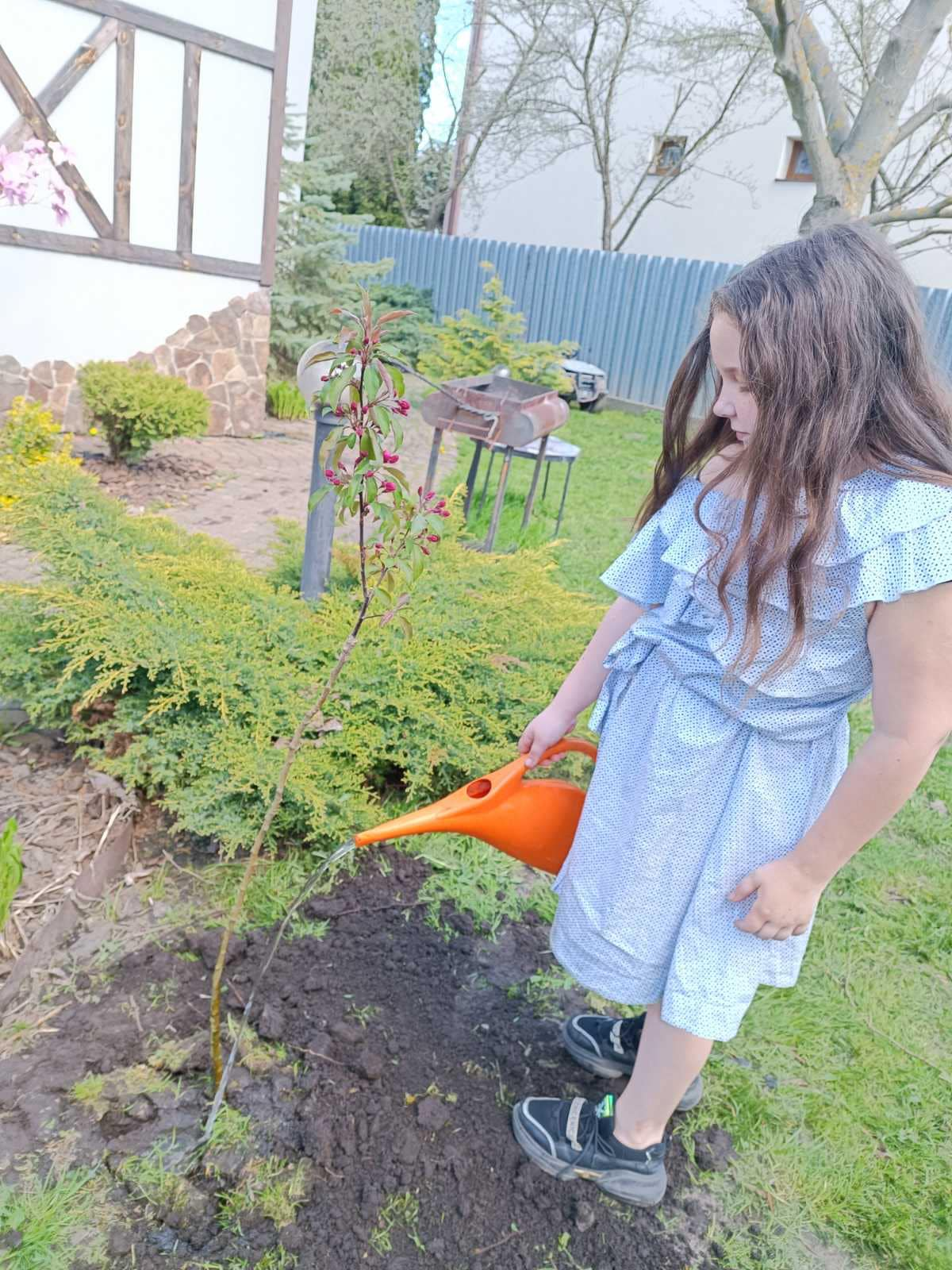
Bazhena Pavlenko, 5-B grade, and her "tree of peace." Photo from the official page of Zaporizhzhia Secondary Environmental School No. 20 on Facebook.
The fifth-grader Bazhena Pavlenko planted a "tree of peace" in her house's yard, where she temporarily lives in the western Lviv region. It is a decorative Ola apple tree, which is also known as the apple tree of paradise. "I chose this tree because I want our blossoming country to be like a paradise after the victory," the girl explained.
Environmental activist is a new community leader
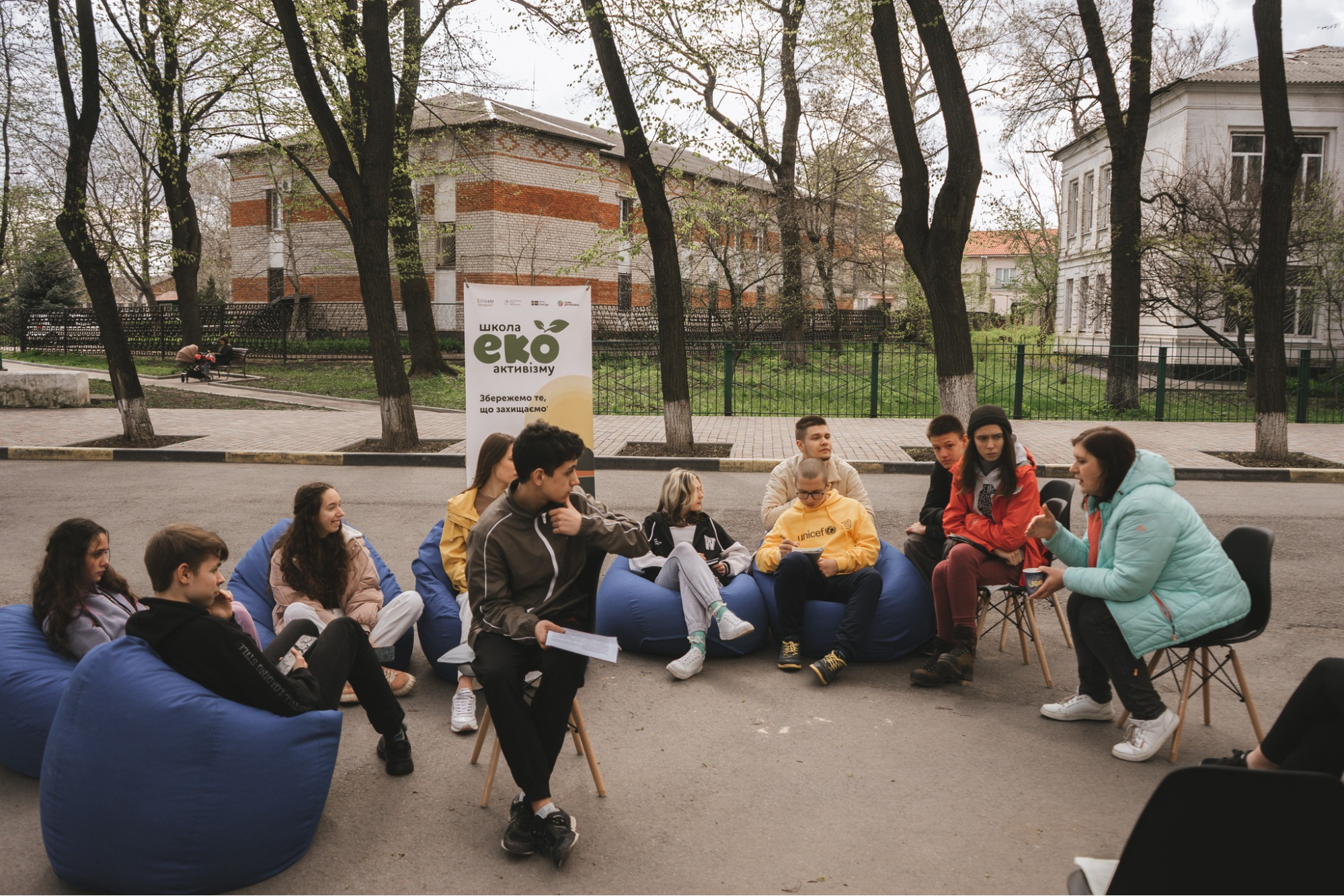
Classes at the "School of Eco-Activism"
Ukrainian New Druzhkivka NGO is implementing a project for young people called the School of Eco-Activism. Before the war, the initiative worked in the Donetsk region. Last November, the team had to move to the city of Kropyvnytskyi in central Ukraine. The idea to create a School of Eco-Activism arose due to new challenges the New Druzhkivka team faced during a large-scale war.
"We understand how critical the environmental situation is in our country. It is vital to plan now how we will rebuild Ukraine after victory," says Anna Pavlenko, the head of the school. Today it is necessary to start studying modern environmentally-friendly approaches to eventually attract all the resources to preserve and restore our country as much as possible."
The School of Eco-Activism lasts five months. During this time, youngsters are trained by experienced professionals and activists. The program includes about a dozen training sessions on environmental topics. For example, local expert Anastasia Prokopenko imparts knowledge to the students about communication strategies. At the training the other day, she explained how they could be used to influence the development of their community and communicate effectively with the authorities, including solving environmental issues. Teenagers and trainers discuss project approaches, look for opportunities for joint initiatives, and obtain tools to make cities comfortable at the workshops.
Learning to compost in kindergarten
Preschoolers from western Lutsk are taught to compost organic waste. The city council began installing composters in local kindergartens several years ago. Last year, authorities purchased 20 composters for children's facilities, adding up to 26 more this spring.
Kindergarten No.19 was one of the first in the city to install a composter properly. The facility members state that the new asset teaches children to sort waste, frees up space in usual trash containers, and creates soil, which is nutritious for the institution's flower beds.
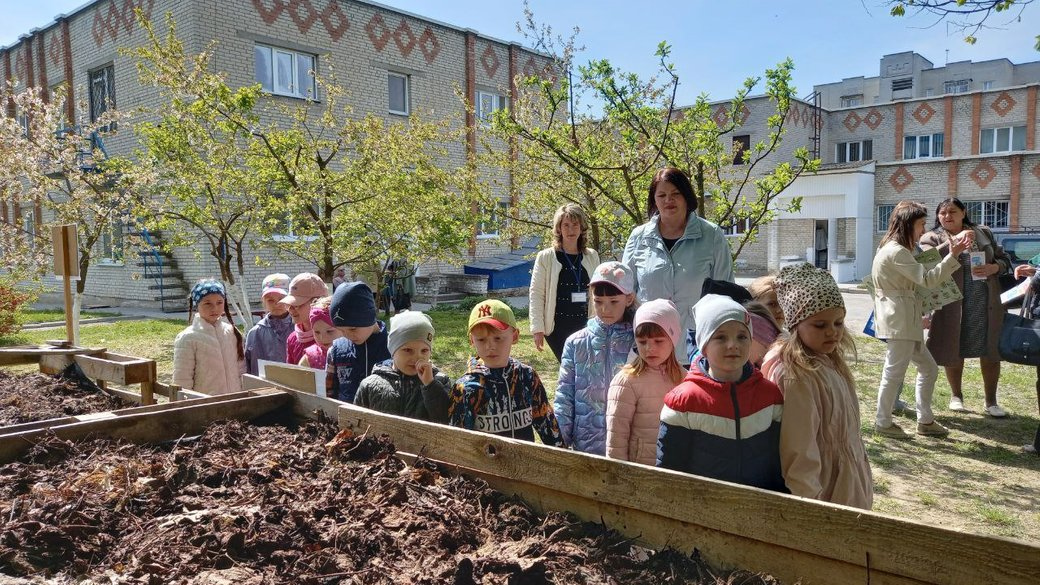
Handmade composter from pallets, which was made in kindergarten No. 11 in Lutsk
Last year, the Lutsk kindergarten crafted its own composter from wooden pallets. To do so, teachers used agro fiber and wrap for the pallets and poured in some soil. The children put leaves there and added water with nutritious microelements.
The preschoolers' parents suggested this project, called "Chain of Kindness." Its main goal is to teach children how to compost waste. Parents believe students will find it interesting to collect organic waste at home, such as apple and banana peels, and bring it to the kindergarten. Now they know that sorting waste will protect the environment.
Small steps to a cleaner future
The eastern Poltava utility company, which disposes of various types of waste in the city, teaches children to do the same. The enterprise is convinced that sorting begins with an understanding of why it should be done and what it can bring in the future. In collaboration with the Poltava schools, the company has launched a pilot project on waste sorting.

Waste sorting lesson at Poltava school No.23
The first project event took place in May at school No.23. A lesson on "Why it is important to sort waste" was held for second-grade students. During the lesson, children not only listened attentively but also played a didactic game and watched an ecology-themed cartoon.
"Our goal is to develop the project and hold such events on a regular basis. We will be able to instill in children European values and an understanding of global environmental pollution. These small steps will pave the way for a clean future for our community," the utility company emphasizes.
Recently, the facility organized and held a children's drawing contest called "Sort and Save the Planet." The winners' drawings were used for social advertising, which can now be seen all over Poltava's billboards.

Angelina Levishko from Poltava, one of the winners of the "Sort and Save the Planet" contest, with her drawing. Photo from the KATP-1628 Facebook page
Angelina Levishko, a 6th-grade student at Poltava's School No. 27, is one of the contest's winners. The girl learned about the contest from her school teachers and decided to participate without hesitation.
Angelina said that her family cares about the environment and has been taking steps toward waste sorting for a long time. At first, they recycled batteries and lamps that were handed over to the Ecobus (a local bus that runs around Poltava and collects hazardous waste), and then they started sorting waste paper and plastic.
Learn about the environment and make friends
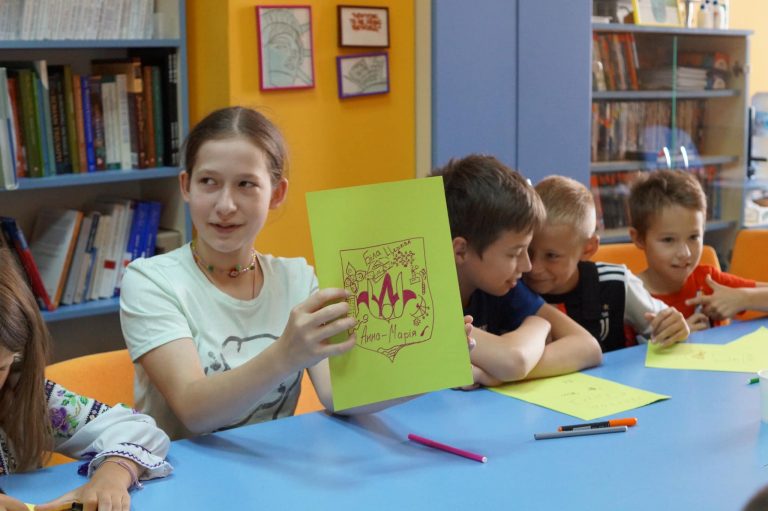
Workshop at the summer children's camp "Safe holidays with new friends." Photo: "Ecosphere" NGO
Environmental education for children who have experienced the horrors of war should be combined with psychological support. The "Ecosphere" NGO has been hosting summer activities for children called "Safe Holidays with New Friends" in the western city of Uzhhorod for the second year in a row.
The program includes ten activities for psychological support of displaced children. During the summer, they will attend workshops and quests on the following topics: "Waste Reduction," "Garbage Sorting and Recycling," "Forest Ecosystems," "Exotic Places of Uzhhorod," "Solar Energy," "Birds in Urbanization,," and others. Other camp activities include birdwatching on the Uzh River, tours to the Uzhhorod Botanical Garden, and medieval castles. Children will visit two National Nature Parks, where they will learn about the biodiversity of the region, play eco-games, and master teamwork.
The project founders believe that social interaction with other teenagers, educational activities, and new experiences will allow displaced children not only to learn something useful about the environment but also to receive psychological rehabilitation.
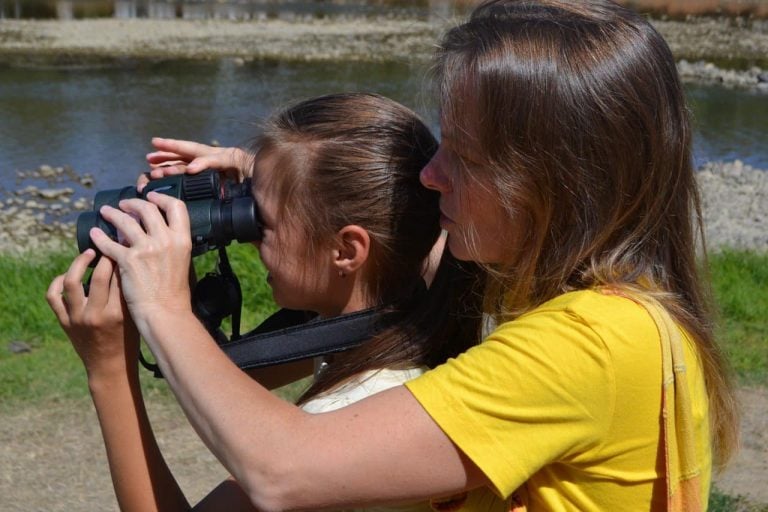
Birdwatching on the Uzh River. Photo: "Ecosphere" NGO
Last year, about 500 children attended the project's classes. The NGO notes that adapting to a new environment through creativity, acquaintances, and travel helped children to feel seen, while the activities directed children's energy to learn new knowledge and skills in the environmental field.
More useful solutions!
Environmental education should be integrated into all areas of children's lives. These values and practices should be introduced not only at school, in public organizations, or at the local level but also, above all, in the family environment. Parents should create an atmosphere where environmental awareness is part of family culture and values.
Teachers and psychologists advise that it is better to study ecology with children as a game:
- While having a walk in a park or forest, tell your children about its birds, animals or insects. Share stories about flowers and trees that grow there. Play the "Why?" game with your child, and answer all his or her questions. Do not discourage them, but praise their curiosity. Otherwise, they will gradually lose interest in the world. Afterward, care for them will disappear too.
- Listen to the sounds of nature. Nowadays, you can find recordings of rain sounds, the sea, birds screeching, and animal voices everywhere. Then ask your children what they like the most.
- Make bird feeders. Find out how to feed them properly together with your child. Add food to the bird feeder regularly. Learn which species stumble upon your hanging box.
- Make your walks in the park an easy clean-up day. Take trash bags and gloves with you. Teach your children not to litter on the street, as it belongs to the trash bin. If there is no container nearby, tell them to put it in a purse or pocket to throw it away later.
- Encourage your child to do gardening. You can plant a tree or a bush in the park. Make a flower bed near your house. Take care of indoor flowers in your apartment. Teach your child to take care of the planted plants, such as watering and fertilizing them.
- Look through old toys and clothes with your child. Ask your children what they no longer play with and take it to a container for the people in need or recycle it.
- Sew an eco-bag. Use it and carry it around to make your children follow this example.
- Sort the waste together. Explain that it is the right thing to do and why. You can also do it as a game by telling your children that you are superheroes who save the planet.
- Play "What happens if…" Ask your child what will happen if water runs out. Will all the plants die? Will the air become polluted? Let children use their imagination. Guide their answers in the right direction. They should understand the importance of caring about the environment.
- Read environmental literature. Today there are many books for children that mention issues, consequences, and solutions to environmental problems.
Newsletter
Digest of the most interesting news: just about the main thing


